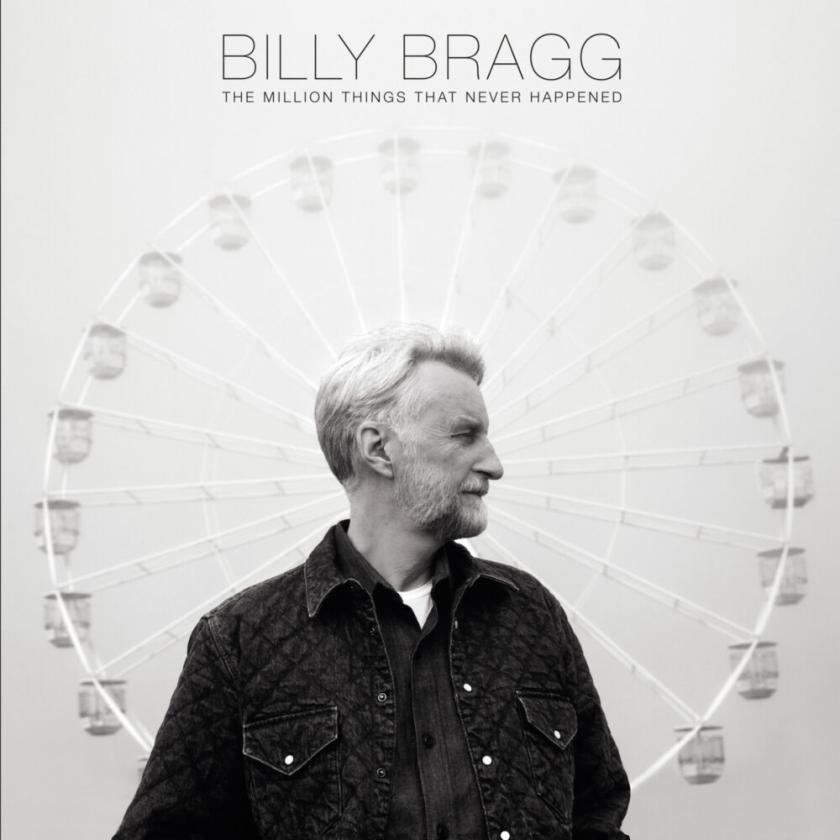Like a more genuinely earthed Springsteen, Billy Bragg’s middle-aged, Dorset years have offered somewhat self-conscious wisdom and awareness of his singer-songwriter status. He’s grown up and into himself, diligently expanding both his craft and ideals. Like his near contemporary Elvis Costello, he has also found musical comfort in Americana and country-soul, with accompanying, initially disorientating American accent.
The Million Things That Never Happened was additionally inspired by the recent sharp fear, as successive tours were cancelled, that Covid might permanently decimate his working life. In practical terms, the pandemic also left co-producers Romeo Stodart and Dave Izumi with a free arranging hand in their Eastbourne studio, as lockdowns locked the album’s star turn in the West Country. This country-soul sound therefore has some of Stodart’s band The Magic Numbers’ buoyant Sixties pop warmth, an oaky, fireside glow.
“Mid-Century Modern” is Bragg’s political reckoning with the 2010s. Where “Waiting For The Great Leap Forward” laced his protest songs with wry, moving humour as Thatcher’s third election landslide brushed them aside, here he contemplates his own redundancy: “I’m used to people listening to what I have to say/So I find it hard to think that it might be best if I just stepped away.” His socialist mantras may comfort “like an old armchair”, but faced with “the credulous...on crusade against reality”, and youthful statue-busters, he opts to learn from the latter. Heavy on Hammond and lap steel, it’s an anthem to dousing “my self-righteous temperament” and getting with the programme.
“Freedom Doesn’t Come For Free” is an amusing parable about the limits of libertarianism, in which New Hampshire right-wingers throw off the shackles of the state, only to find themselves in desperate competition with bears who “don’t always shit in the woods”. “The Buck Doesn’t Stop Here No More” is a top-notch Bragg protest, devastatingly understated in its reaction to Trump and the Capitol insurrection, as “the patriots have no shame”. Lines trail off at verses’ end and the Hammond hums, in sadness more than anger.
The album’s title track is, though, its main concern. It’s a rueful elegy for all the pandemic’s irrevocable losses – its lack of “a hug for the crying, a kiss for the dying”. “Good Days and Bad Days” navigates a depressive fog, in a cracked Barking growl. And if that contrasts with the lovely, exuberant “Reflections on The Mirth of Creativity”, and the devotional love song “I Believe In You”, “I Will Be Your Shield” again tackles Covid’s dismantling of already battered certainties. “Pressure wrought by changes” making “the world beyond your doorstep” alien are redeemed when “our love is the one thing that’s true”. It’s a song born from Bragg’s “conclusion that empathy is the currency of music”. So are the unabashedly sentimental, big choruses of “Pass It On”. And if the former song hints at Simon & Garfunkel’s sepulchral ballads, Coldplay’s broad, empty platitudes also sit uncomfortably close.
The man who wrote “Levi Stubbs’ Tears” in 1986 never lacked craft, but its broadening allows the Jimmy Webb-like, stately piano ballad “Lonesome Ocean”. This sanguine song, sung with a mature balladeer’s voice, shows this album’s qualities: reflective not raw, rueful not raging, an honest evolution from scrappy youth into elder. And there it sits, a little back from the fray, a little too comfortable, but always trying.















Add comment